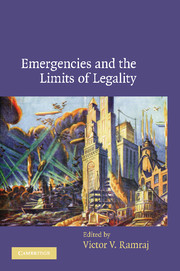Book contents
- Frontmatter
- Contents
- List of contributors
- Preface
- Introduction
- PART ONE Legality and extra-legality
- PART TWO Conceptual and normative theories
- PART THREE Political and sociological theories
- PART FOUR Prospective constraints on state power
- PART FIVE Judicial responses to official disobedience
- PART SIX Post-colonial and international perspectives
- 14 Exceptions, bare life and colonialism
- 15 The struggle over legality in the midnight hour: governing the international state of emergency
- 16 Inter arma silent leges? Black hole theories of the laws of war
- Index
- References
15 - The struggle over legality in the midnight hour: governing the international state of emergency
Published online by Cambridge University Press: 10 August 2009
- Frontmatter
- Contents
- List of contributors
- Preface
- Introduction
- PART ONE Legality and extra-legality
- PART TWO Conceptual and normative theories
- PART THREE Political and sociological theories
- PART FOUR Prospective constraints on state power
- PART FIVE Judicial responses to official disobedience
- PART SIX Post-colonial and international perspectives
- 14 Exceptions, bare life and colonialism
- 15 The struggle over legality in the midnight hour: governing the international state of emergency
- 16 Inter arma silent leges? Black hole theories of the laws of war
- Index
- References
Summary
Introduction
While it is premature to enter a final verdict on the impact of the events of 11 September 2001 on the political and constitutional order of liberal democracies, one point remains clear: the events of 9/11 have ushered in a vigorous and highly contested academic debate on issues relating to the state of emergencies and the rule of law. What is more, this is far from a mere academic debate. Practices such as torture that were once beyond the pale have now become matters of public concern and debate. Indeed, that these items are now on the public agenda is emblematic of the fact that the events of 9/11 have been influential in transforming our thinking about some fundamental constitutional principles and the institutional edifice of liberal democracies.
On this score there is some justification in Bruce Ackerman's provocative view that the attacks of 9/11 have fundamentally altered the frameworks of the laws of war and crime in Western liberal democracies. In fact, Ackerman goes on to provide an innovative proposal to construct a limited term ‘emergency regime’ which will return to a status quo ante at the end of the emergency. This chapter challenges the assumption implicit in Ackerman's work on emergency powers – an assumption shared by David Dyzenhaus and Oren Gross – that state responses to the events of 9/11 are situated primarily within a horizon of a national emergency.
- Type
- Chapter
- Information
- Emergencies and the Limits of Legality , pp. 360 - 384Publisher: Cambridge University PressPrint publication year: 2008
References
- 3
- Cited by



